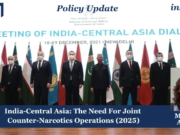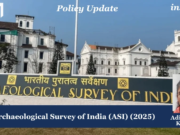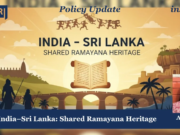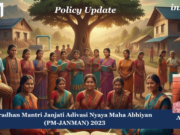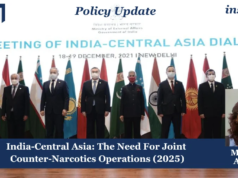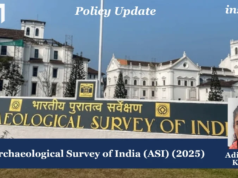Policy Update
Aditi Singh Kaushik

Background
In 1947, the unruly British Raj, which had ruled India for almost two hundred years ended with Indian Independence. The Raj left an undeniable impact on the country’s social, and cultural landscape – including, a complex relationship of cultural exchange and adaptation. It started with the formal introduction of English as a medium of instruction for higher education in the 19th century, which later gave rise to a distinct group of authors who were fluent in their native tongues as well as in English.
Over the years, the adoption of English as the primary medium for literary expression became one of the most pivotal legacies of British colonialism. At the same time, it brought forth a situation where Indian authors were entangled by a literary form that was influenced by both the colonial legacy and a literature that was indigenous in identity. This relationship between literature and colonialism has been discussed in several postcolonial studies debates, including that of Edward Said’s Orientalism. Said’s analysis of the binary opposition between East and West revealed how “western literature formed the binary of the ‘other’, a persistent issue that post-colonial Indian writers had to deal with.” (Lalwani, 2021).
Over decades, such authors have mirrored, adapted and re-interpreted this colonial legacy into a new culture of indigenous literature that has a voice of its own. Authors like Arundhati Roy, R.K. Narayan, Vikram Seth, and many others have emerged as pivotal figures bringing such change. Today, in the age of blurred boundaries – geographical and digital, Literary Festivals, such as the Jaipur Literature Festival, Khushwant Singh Literary Festival, and events like the India-UK: Year of Culture, have emerged as catalysts paving the way to rich, nuanced discourses on shared literary roots residing between India and the UK.
Tracing India in Colonial Literature
For a long time, India has viewed its culture, literature and history through the lens of outsiders. So much so that literature written during the British Raj belonged to two separate groups –
- Group One – This group claimed it was the British Raj that helped improve the standards of life in India. Examples of such yesteryear’s literature with a pro-imperialistic stance include Joseph Rudyard Kipling’s infamous poem The White Man’s Burden (1899). In this poem, Kipling attempted to solidify the colonial belief that the British Empire was a force for good, and it was the Englishman’s ‘divine burden’ to reign over colonised natives. This stance was typical of the ruling English class that consistently viewed British colonialism as “a mission of civilisation that eventually would benefit the colonised natives.” (Patil, 2021)
- Group Two – This group viewed the imperialistic stance as a trick to hide the British Raj’s ambitions to rule India. Writers within this lot did not attempt to show the English as saviours; rather, their writings focused on the obtuseness of the ruling British class. E.M Forster’s A Passage to India (1924) emerges as one such example. In this seminal work, Forster highlighted the other side of British colonialism in India, and also prioritised displaying the social and cultural side of the country, putting them beside British Colonialism. (Patil, 2021)
With the culmination of World War II, cracks started emerging within the British Empire. Nationalist movements started gaining pace in the then British colonies. Gradually, these colonies gained independence one by one, including India. For literature, this phase is described as one of the most ‘dramatic phases in the history of English literature.’ In India, independence from the British paved the way for a new set of authors whose work, today, reflects indigenous storytelling coupled with the complexity of post-colonial existence and personal voice, sometimes in the form of post-colonial or diaspora literature.
Tracing Remnants of the Colonial Past
In his seminal work, Imaginary Lands – A Collection of Essays and Criticism, 1981-1991, Indian-British writer Salman Rushdie, concludes one of his first essays by highlighting British colonialism’s complex and intangible impact on Indian-origin English authors tracing their literary influences. He says, “Indian writers in England have access to a second tradition, quite apart from their own racial history. It is the culture and political history of the phenomenon of migration, displacement, and life in a minority group.” He further asserts that these authors can quite legitimately trace their literary forebearers from Conrad and Marx to Rabindranath Tagore and Raja Ram Mohan Roy.
Continuing on similar lines, Indian writer Arundhati Roy’s award-winning book – The God of Small Things (1997), serves as a metacommentary on the long-lasting impacts of colonialism in the lives of those living in the breakdown of political independence, particularly in the areas of caste, class and gender. Lalwani (2021) refers to Roy’s incorporation of English in her work as a reclamation, as well as a resistance to those structures of power that continue in postcolonial India.
Literary Festivals and Shared Heritage
In today’s age of blurred boundaries, Literary Festivals have emerged as instrumental catalysts in carrying the ongoing cross – cultural conversation between British Colonialism and postcolonial India. Festivals, like the Jaipur Literature Festival (JLF), have emerged as platforms that give impetus to many of such ‘uncomfortable’, yet much needed conversations. This is exemplified by one of the debates held in the 2020 edition of the JLF, where a question emerged on whether statues of former imperial heroes should be placed in the museum of colonialism, pointing to the dearth of imperial history in the English curriculum.
Similarly, festivals like the Khushwant Singh Literary Festival, held yearly in Kasauli, pay tribute to the revered author and journalist Khushwant Singh. This festival, like the JLF, is held in London as well, to honour the place where the Late Khushwant Singh worked and studied. The London edition of the festival honours the city as a place which was instrumental in shaping Singh’s myriad concerns as an author who remained a “critic of the establishment and a challenger of hypocrisy.”
Other cross-cultural events like the India-UK: Year of Culture help reaffirm the belief that literature is one of the mainstays of the ‘Living Bridge’ between India and the UK – a term first used by Prime Minister Modi to capture the unique exchange of cross-cultural heritage between the two countries.
References
- Rushdie, S. (1992). Imaginary Homelands: Essays and Criticism, 1981-1991. Penguin Group, USA.
- Lalwani, N. & Department of English Govt. D.B. Girls P.G. College Raipur. (2021). Cross-Cultural Dialogues: The Impact of British Colonialism on Post-Independence Indian English writing. In Ilkogretim Online – Elementary Education Online (Vol. 20, Issue 1, pp. 9102–9105) [Journal-article]. https://doi.org/10.17051/ilkonline.2021.01.933
- Patil, J. (2021). Indian ethos as reflected in the works of British writers. In A Half Yearly National Peer-Reviewed & Indexing With SJIF Impact Factor Research Journal (Vol. 1, pp. 1–2) [Journal-article]. http://knowledgeresonance.com
- M S, M. (2024). The impact of British colonialism on Indian Literature: A comprehensive analysis of the enduring effects of colonial rule on themes, styles, and narratives in Indian English literature (Vol. 10, Issue 10, pp. 20–22).
About the Contributor: Aditi Singh Kaushik is a Research Intern at IMPRI. She holds a Master’s degree in Political Science from Banaras Hindu University. Her research interest lies in understanding the evolving roles of traditional and organic intellectuals in post-colonial countries, within a Gramscian framework.
Acknowledgement: The author sincerely thanks Ms. Aasthaba Jadeja and the IMPRI team for their valuable support.
Acknowledgement: The author sincerely thanks Aasthaba Jadeja and other IMPRI fellows for their valuable contribution.
Disclaimer: All views expressed in the article belong solely to the author and not necessarily to the organisation.
Read more at IMPRI:
Bridging Gaps in Education: The Post-Matric Scholarship for SC Students
Strengthening Farmers’ Security: Pradhan Mantri Fasal Bima Yojana (PMFBY), 2016


